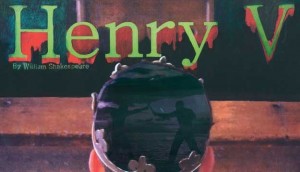 Last Saturday, 30 November, the British Shakespeare Association held its Annual General Meeting. The BSA is an association of “teachers, researchers, theatre practitioners, writers and enthusiasts” and is a relatively young organisation that has existed for less than fifteen years. Without a single geographical focus, the major focus of the organisation is its biennial conference and the publication of a quarterly journal Shakespeare. Its Education section also publishes a bi-annual magazine Teaching Shakespeare which is available free of charge through the Shakespeare in Education blog.
Last Saturday, 30 November, the British Shakespeare Association held its Annual General Meeting. The BSA is an association of “teachers, researchers, theatre practitioners, writers and enthusiasts” and is a relatively young organisation that has existed for less than fifteen years. Without a single geographical focus, the major focus of the organisation is its biennial conference and the publication of a quarterly journal Shakespeare. Its Education section also publishes a bi-annual magazine Teaching Shakespeare which is available free of charge through the Shakespeare in Education blog.
Each conference is held at a different location, and the next will be on 3-6 July 2014 at the University of Stirling. Its theme will be Shakespeare: Text, Power, Authority. To quote the website, “in the four hundred and fiftieth year since Shakespeare’s birth, this conference seeks to explore questions of authority for Shakespeare, in Shakespeare, and about Shakespeare. It aims to investigate the relationship between text, power, and authority, both in the writing of Shakespeare and in writing about Shakespeare. Shakespeare’s works ask us repeatedly to think about what constitutes authority, about where authority lies, and about the performance of authority. Shakespeare has also himself repeatedly been used as a form of cultural capital and authority, and we therefore also welcome contributions that explore some of the different ways in which his plays and poems have been deployed in various times and places. Shakespeare’s works prompt us to think about textual authority, too. What is textual authority? What makes one text more authoritative than another? How have ideas of textual authority changed over time, and what, politically, is at stake in these changes? ”
There are sure to be a lot of sessions looking at Shakespeare and politics, and in the year of the Scottish referendum proposals on Shakespeare and Scotland are particularly welcome. There will be a blend of lectures, papers, workshops and seminars broadly on the theme of the conference, as well as performances and excursions. Anyone wanting to contribute to the conference can contribute an abstract by the end of January, and instructions are on the site. With keynote speakers including Professor Margreta de Grazia (University of Pennsylvania), Professor Andrew Murphy (University of St Andrews), Professor John Drakakis (University of Stirling),Dr Colin Burrow (University of Oxford) and Dr Michael Bogdanov (Director, The Wales Theatre Company) it’s sure to be a stimulating few days. Registration is already open.
The Shakespeare in Education blog launched in spring 2012 after the conference in Lancaster. It provides a forum for sharing ideas and experiences relating to education. Anyone wanting to contribute can do so and instructions explaining how to do so are on the site.
Also in early 2012 the related magazine Teaching Shakespeare began publication, edited by Dr Sarah Olive. Four issues have now appeared, and all are available for download from the blog, as well as for purchase. It’s regularly published in February and September.
In the current issue I’ve particularly enjoyed Cathleen McKague’s engaging article about teaching an unruly group where “classroom management was a constant and often overwhelming task”. She tells how she found a solution by teaching The Tempest.
” What does one do with a class of energetic spotlight-stealers? Why, give them a stage, of course! I quickly fashioned a weeklong lesson plan in which we would use an exploration of Caliban’s ‘enchanted isle’ speech as a springboard to discussing and reading the Usborne version of the play”.
 Perry Mills’ thoughtful retrospective on the experience of performing Henry V in April 2013 with his group Edward’s Boys (about which I wrote at the time) is also a great read, whether or not you’re involved in teaching. Three performances marked the centenary of one put on at the first Shakespeare Memorial Theatre by the boys of King Edward’s School. They could not have known back in 1913 that a devastating war would be so soon declared, in which all the boys who appeared would fight, seven of them losing their lives.
Perry Mills’ thoughtful retrospective on the experience of performing Henry V in April 2013 with his group Edward’s Boys (about which I wrote at the time) is also a great read, whether or not you’re involved in teaching. Three performances marked the centenary of one put on at the first Shakespeare Memorial Theatre by the boys of King Edward’s School. They could not have known back in 1913 that a devastating war would be so soon declared, in which all the boys who appeared would fight, seven of them losing their lives.
Membership of the British Shakespeare Association and attendance at conferences is open to all, not just UK residents or citizens or those actively involved in teaching or research.


